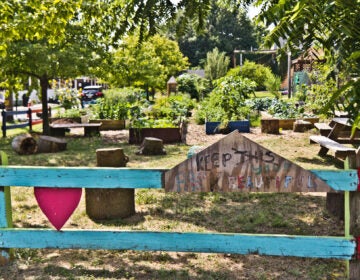Philadelphia Land Bank halts plan to redevelop Kensington gardens into housing
A housing development planned for a gentrifying area was hit with a firestorm of resistance from neighbors who will lose land that they use as gardens.
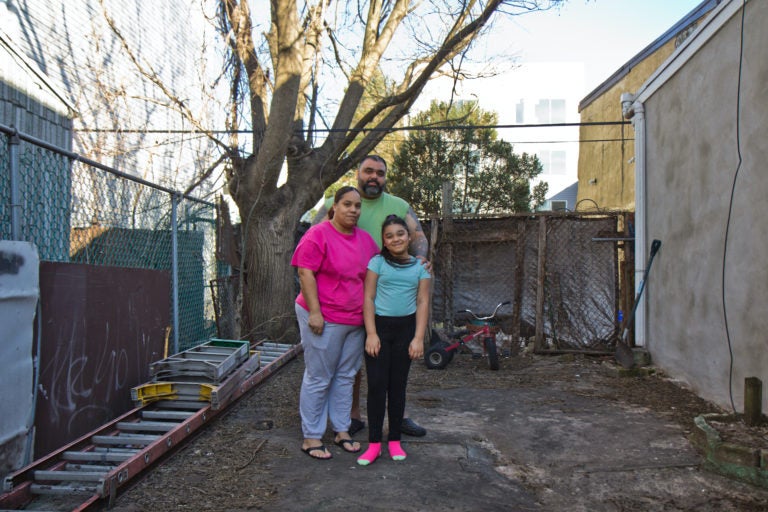
Adamarie Baez and Daniel Ortiz with their 10-year-old daughter Kaylee in the lot next to their home they’ve maintained and gardened in for years. (Kimberly Paynter/WHYY)
Daniel Ortiz and his wife, Adamarie Baez, moved into their Kensington home eight years ago and quickly fell in love with their side yard.
The house came to Ortiz by way of his father and his grandmother before that. Thirty years ago, his grandmother fenced the vacant lot, cleaned it and made it a place for the family.
Ortiz, a construction worker, continued to improve the lot after moving in, turning it into a safe play space for the couple’s two daughters, now 17 and 10 years old.
The youngest, Kaylee, has autism and doesn’t go outside the home much. Ortiz and Baez say the yard is crucial for her development.
“That’s her play area — that’s where we do arts and crafts, that’s where we do pool, we get to join her on the floor, we get to grow plants — it’s her outdoors,” Baez said.
But even though the Ortiz’s kitchen door opens to the yard, the lot is not actually owned by them. The land is vacant and owned by the city — and now, the Philadelphia Land Bank wants to reclaim it.
At a contentious board meeting held Tuesday, staffers for the quasi-governmental entity presented a proposal to lease the Ortiz lot — together with other 58 vacant lots in about four city blocks between West Norris and Berks streets, 3rd and 4th streets — to Asociación Puertorriqueños en Marcha (APM) for five years.
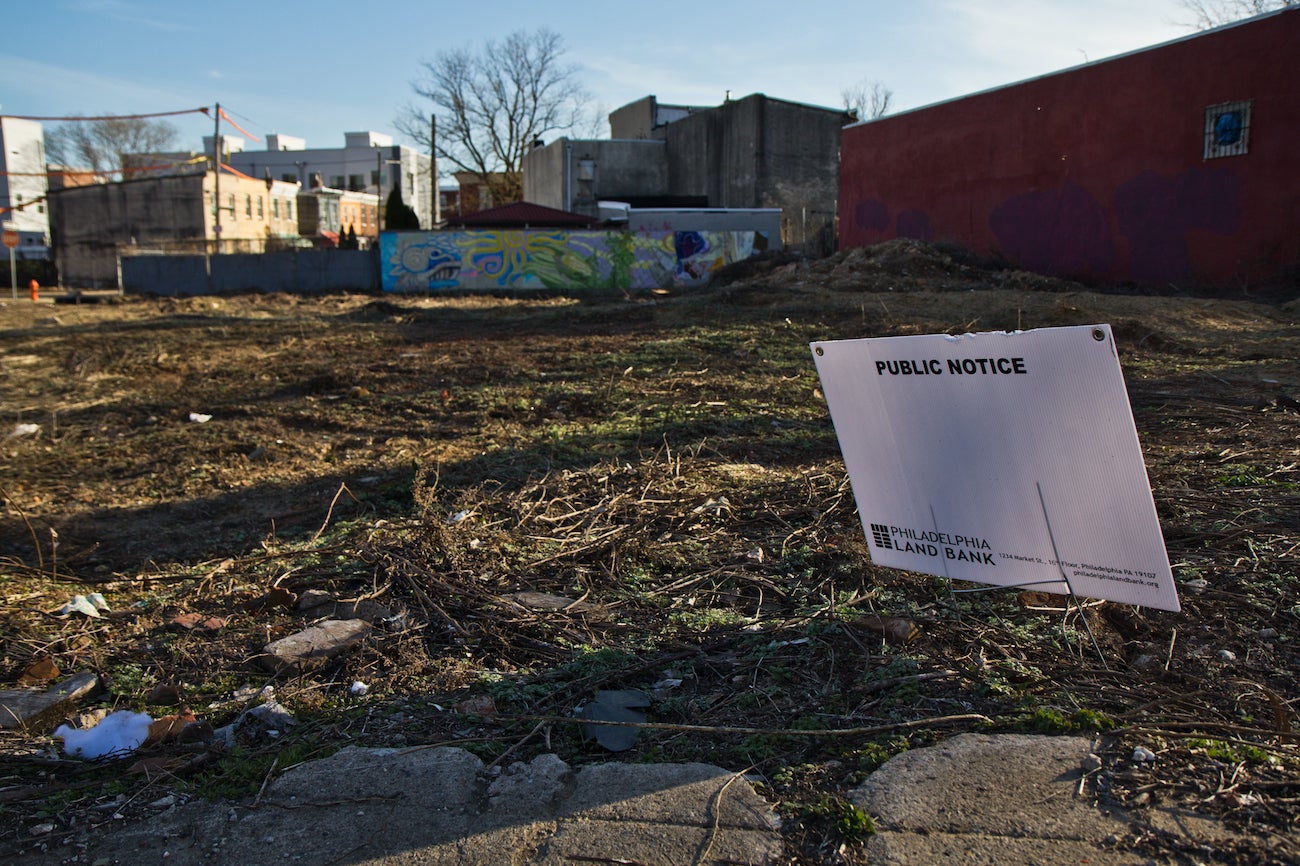
in Kensington. (Kimberly Paynter/WHYY)
The nonprofit agency would lease the land for $59 a year while it worked to develop a plan for new housing designed to meet a growing need for both affordable and market-rate housing in the fast-gentrifying area. But neighbors say the project would displace them, and cost the neighborhood needed community space.
“I understand that it was not [my grandmother’s property] when she took over it, but she did take time and effort to keep it nice,” Ortiz said. “It will be heartbreaking.”
The mixed-income housing development — financed with a mix of private equity, public subsidy and other sources — would be built in partnership with Scannapieco Development Corporation, the company behind some of the highest-end condo buildings in the city.
The APM-Scannapieco joint venture is still in its early phases with many details still not finalized. But according to the proposal presented to the Land Bank, 51% of the homes will be sold to persons earning between 61 to 120% of area median income, which was $72,100 for a household of 4 in 2019. The remaining 49% would be sold at market-rate prices, according to the proposal.
Ortiz, Baez and other neighbors who have been using some of the vacant lots for gardens and yards for decades found out about the project last week when signs posted by Land Bank popped up in each of the 59 parcels. At least 10 of the 59 lots are currently in use by residents of the neighborhood, a working-class Puerto Rican and African American enclave.
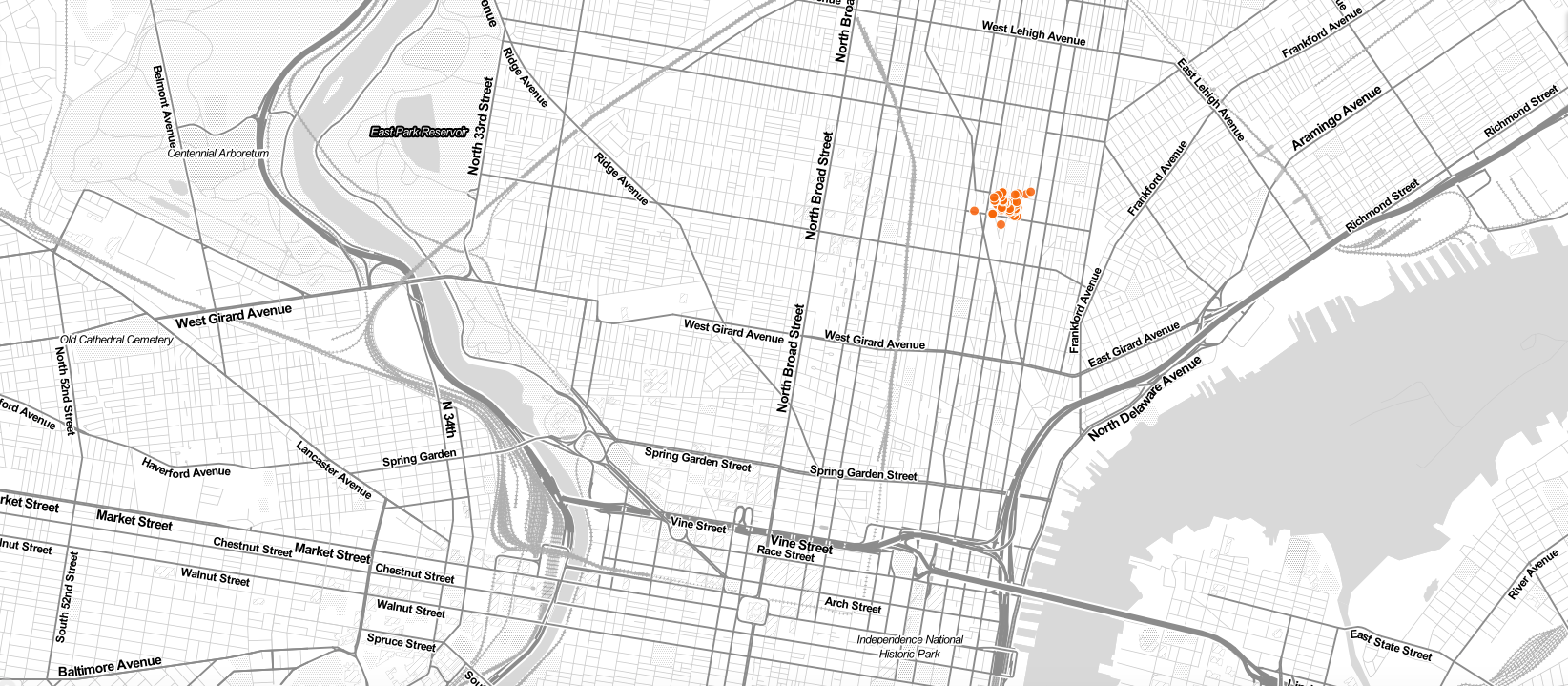
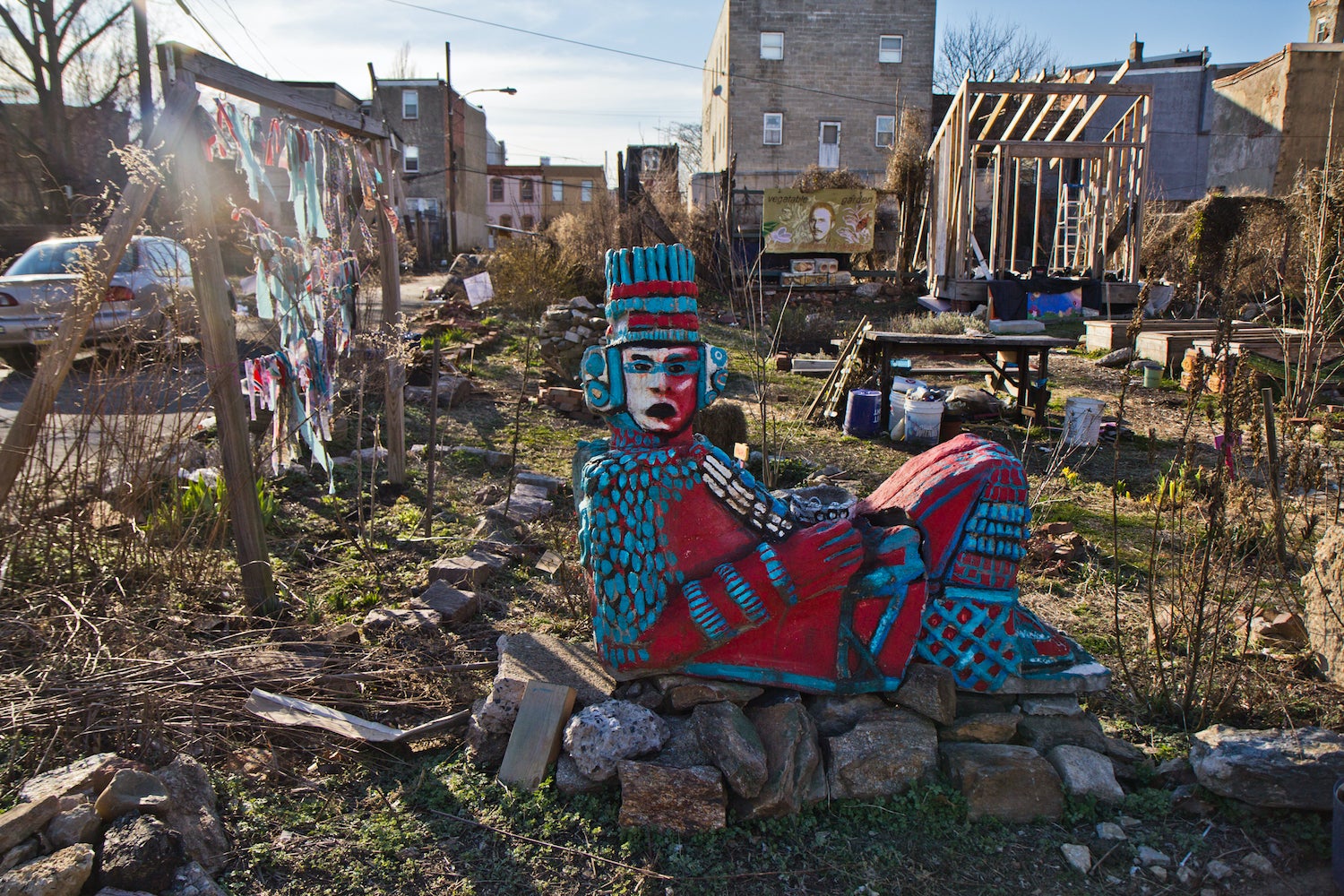
Baez said the proposal is especially painful because they’re Puerto Rican and APM, an organization with a mission to empower Latinos in the area, never let them know this was coming.
“I feel like the community instead of helping each other, is taking us apart, so we’re being replaced,” she said. “You’re not building for the people in the community. You’re building to bring people into this community who are probably higher-class than us. And that takes away from us. That’s pushing us out from where we are. We are a tight community and you’re pushing us away.”
No one from APM spoke at the board meeting or appeared to be present. But Nilda Ruiz, president and CEO of APM, in an interview following the meeting, said the organization’s plan is actually to protect the community from gentrification.
“I think there’s misinformation,” Ruiz said. “We are looking to build affordable housing. We want to take things out of the market so that we can build affordable housing, but until we know which properties are going to be leased, we have nothing to show the community.”
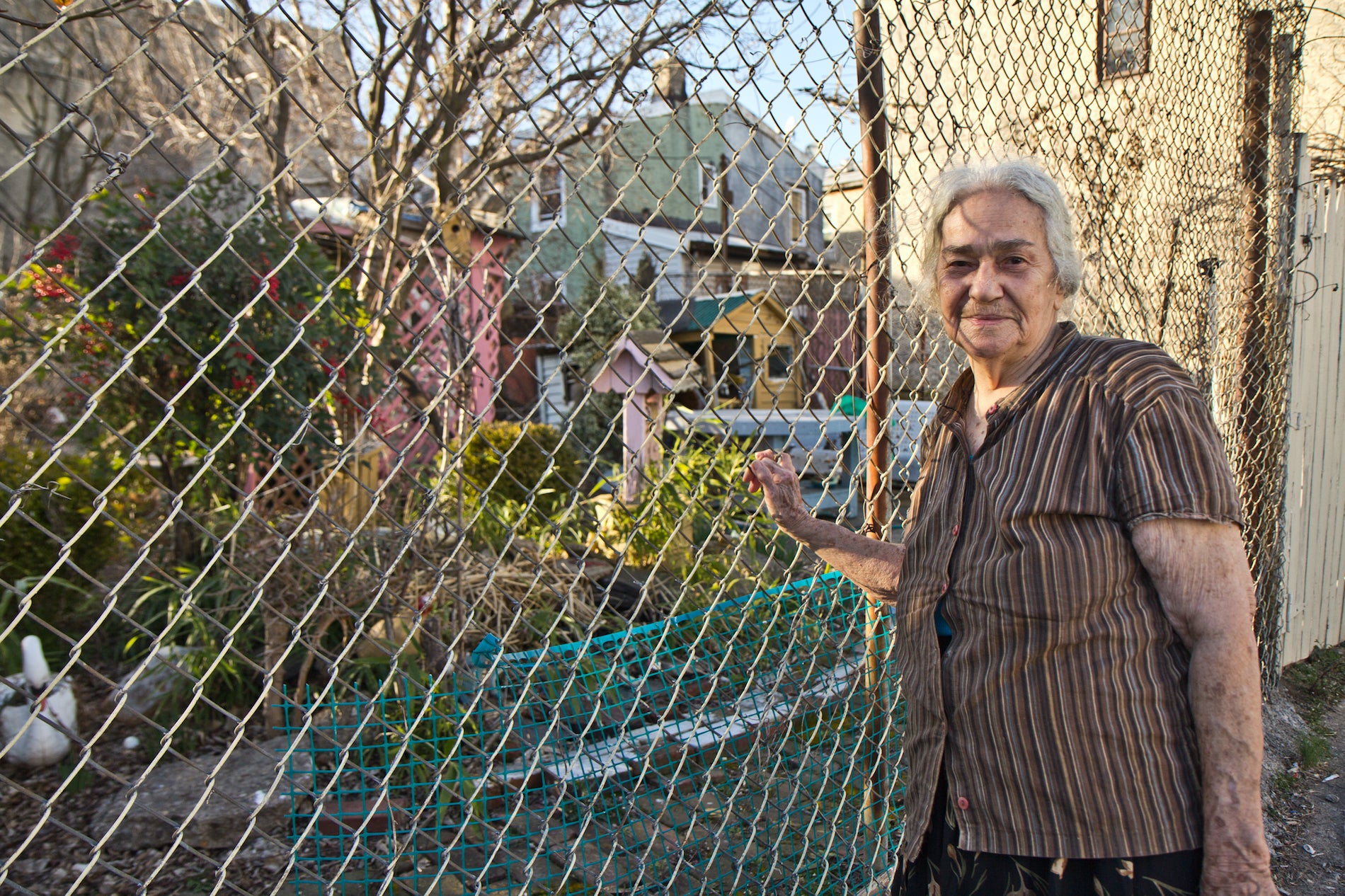
Earlier in the day at the board meeting, Morgana Ginet, 85, said she’s been taking care of the lots next to her home for 30 years. She had letters from the Philadelphia Redevelopment Authority dating back to the 1990s authorizing her to use the lots.
Another neighbor, Shawn Banks, said he uses a lot next to his home as an organization for kids in the neighborhood called Philly Wood 7. And members of the César Andreu Iglesias Community Garden, established in the neighborhood in 2012 by residents and the Philly Socialists organization, said two of the lots required by the APM-Scannapieco venture are right in the middle of their garden, and being used for a cornfield and other community activities.
After hearing comments for more than an hour, the Land Bank board unanimously decided to postpone any decision on taking the city land until a community meeting took place.
“If something needs a community meeting, this is it,” said board member Michael Koonce, director of special projects for City Council. “I think everyone in the board, most folks on the board, would agree that if you have a valid garden agreement or if you want to renew a garden agreement you should be allowed to do that until something actually happens. I don’t think that anybody wants to shut you out right now. But I think there needs to be a little bit more of community planning in this whole thing.”
Another board member, Michael Johns, an architect and the principal of Mdesigns + MWJ Consulting LLC, pointed to a need for a deeper conversation with the community.
“It’s clear more due diligence must be done with Land Bank and APM,” Johns said.
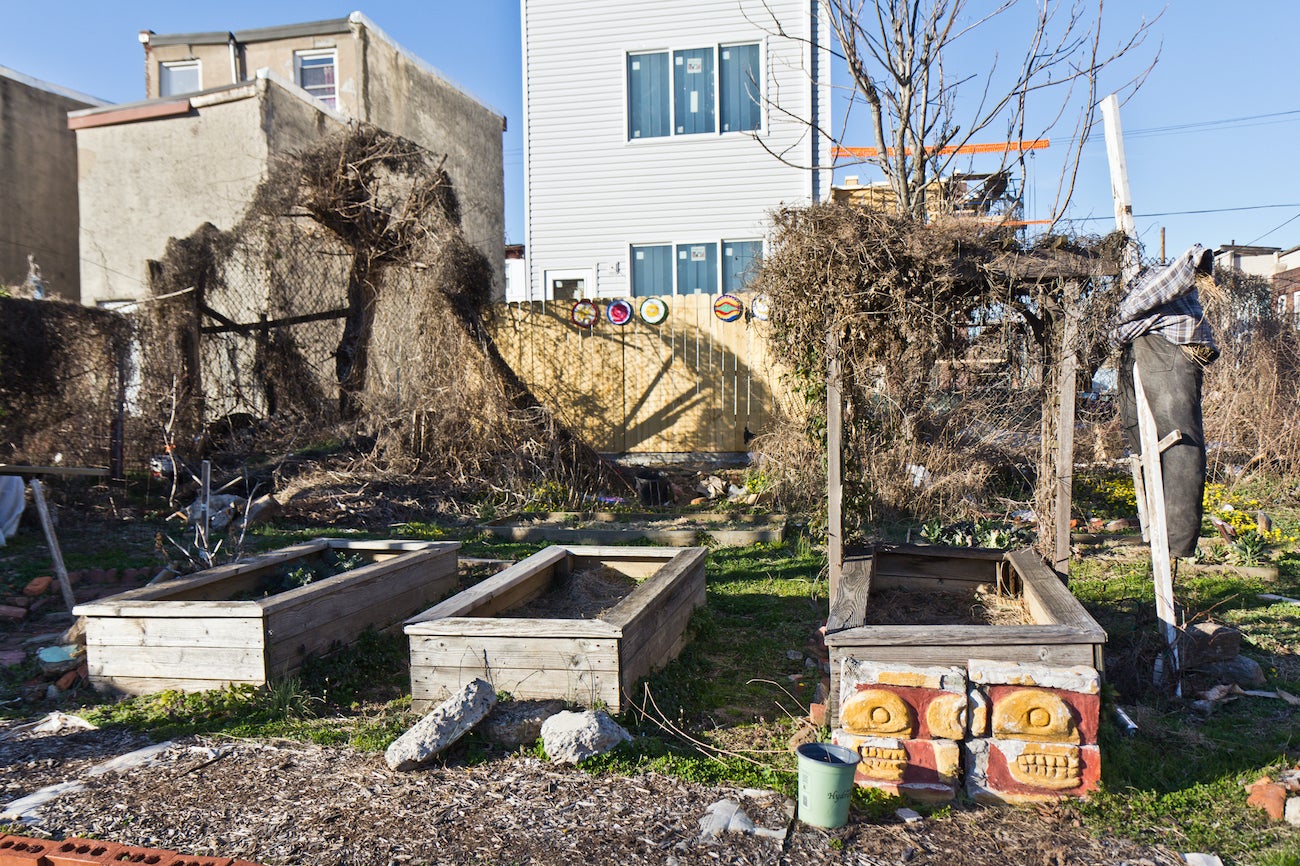
At the board’s request, Land Bank’s executive director, Angel Rodríguez, promised to work with APM and hold a community meeting to address residents’ concerns.
“There is a need for community outreach, which we will discuss with APM,” Rodríguez said. “If this [project] is not viable, it will not be brought to the board.”
Before becoming the Land Bank’s director, Rodríguez served as APM’s vice president.
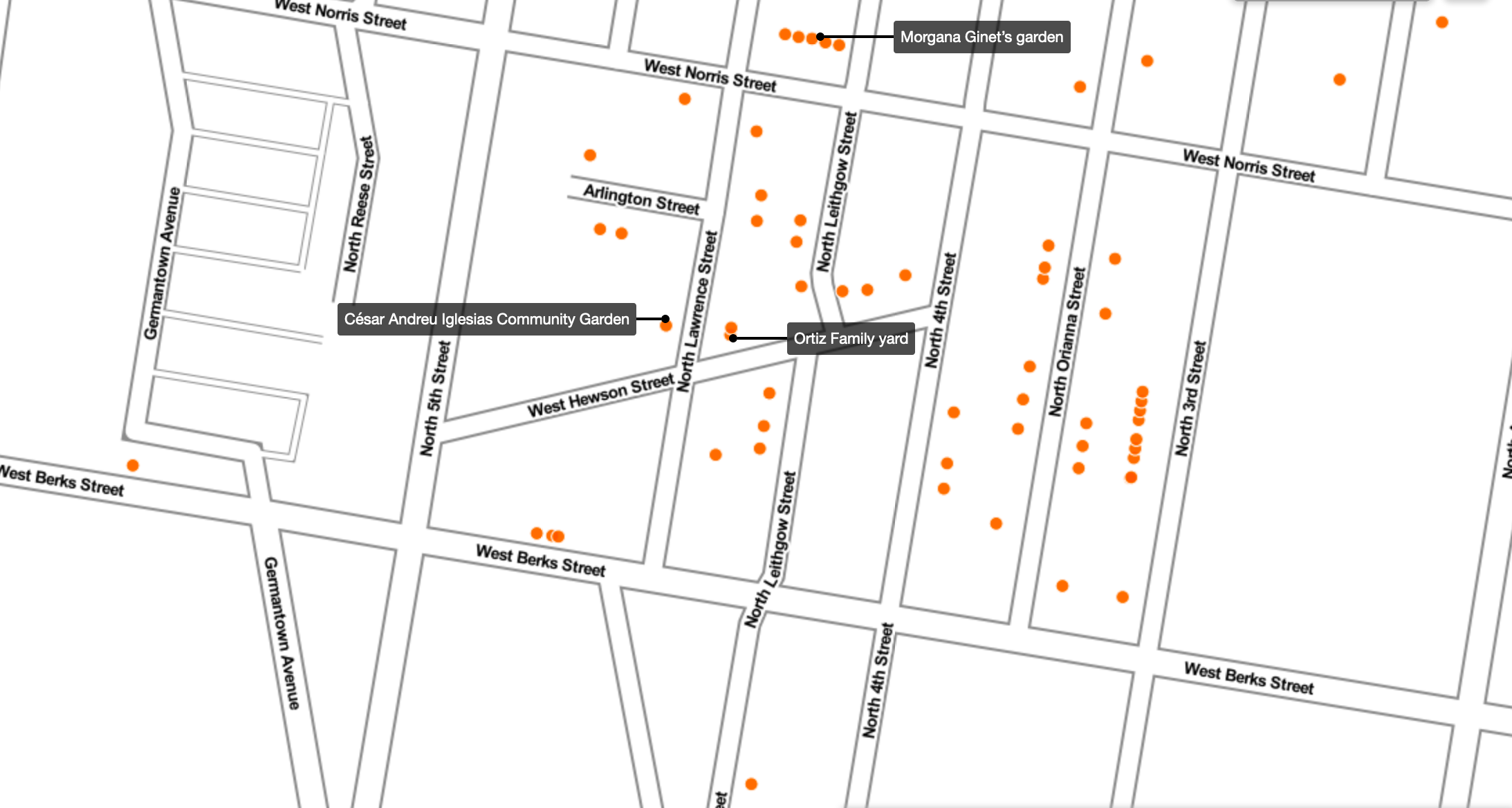
Adam Butler, a representative of the Iglesias garden, said halting the project is not enough. He told the board that the Land Bank staff failed to inform the public about the process. No one explained to people the steps that could be taken to keep control of land they had been tending.
The signs posted by the Land Bank on the vacant lots said residents could give comments to the board but didn’t include a time or location of Tuesday’s meeting.
“It’s ridiculous that a [59] parcel project came up with no public notice, with no prior discussion with anyone,” Butler said. “Even the people in this room didn’t know the scale of an enormous development project that is going to put 50% at market development in a neighborhood that is already decimated by new construction.”
The board’s chair, Christian Dunbar, said the board meeting is intended to be the time to hear comments on proposals.
“We’re stopping the process today so that you can be heard,” said Dunbar, who is the city’s deputy treasurer. “There is a process for every type of disposition the city has. The Land Bank, this meeting and this board, is not the process. The intent was to pass this resolution. Because we heard from you, this resolution is tabled to give you an opportunity to go through the different processes for your voices to be heard.”
If the proposal is approved by the board, it will later have to be approved by City Council.
Iglesias garden members said they were surprised to find two of their lots were included in the package. Last year, they submitted an Expression of Interest with the Land Bank to use one of them as a garden, and say they have been in conversations with the Neighborhood Garden Trust and Councilmember Maria Quiñones-Sánchez to save the garden.
“We feel pretty powerless,” said Lauren Troop, a member of the garden. “We’ve gone through every step available to us.”
APM removed two other garden lots originally included in the lease proposal and the group is evaluating removing the rest, according to Quiñones-Sánchez.
“I strongly believe in equitable development and see APM’s neighborhood plan and the garden as good things for residents,” Quiñones-Sánchez said.
Neighborhood Garden Trust’s Jenny Greenberg said her organization has been providing assistance to the garden.
The city is currently developing an Urban Agriculture Plan to support community gardens.
WHYY is your source for fact-based, in-depth journalism and information. As a nonprofit organization, we rely on financial support from readers like you. Please give today.




